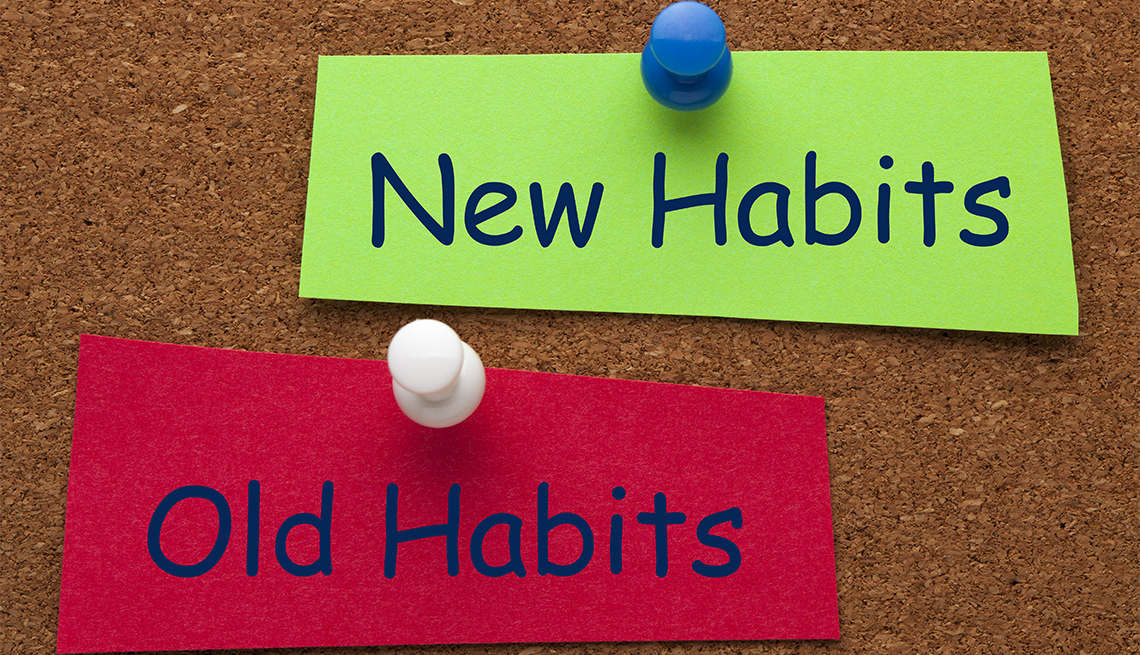8 ways to break bad habits and create good ones
8 ways to break bad habits and create good ones"
- Select a language for the TTS:
- UK English Female
- UK English Male
- US English Female
- US English Male
- Australian Female
- Australian Male
- Language selected: (auto detect) - EN
Play all audios:
Why are bad habits so simple to pick up and good habits so hard to develop? “Bad habits, frankly, are easier,” says Adam Borland, a psychologist with the Cleveland Clinic in Ohio. “They can
become more ingrained because we kind of go on autopilot.” Finding the motivation to exercise or keep up a daily or weekly schedule is more difficult than sitting on the couch and
watching Netflix, for example, Borland notes. But the new year is a perfect time to try something new, to stretch boundaries, to override the tendency to act outside our best interests
without conscious thought. But creating those good habits — and getting away from the bad ones — is even more difficult in the modern era, when we’re often tied to digital devices. “Our
brains are overwhelmed by the way our modern world stimulates them, and the natural systems that we have for building habits have been basically hijacked,” says Russell A. Poldrack, a
psychology professor at Stanford University in California and author of _Hard to Break: Why Our Brains Make Habits Stick._ As a result, it can take some time to create a habit we want to
adhere to for our own good. A lot of digital apps designed to help form habits suggest it takes about three weeks to do the job. But modern research doesn’t back up that time frame — not by
a long shot. Poldrack points to one study from the _European Journal of Social Psychology_ that put the time frame for habit forming at between 18 and 254 days, with an average of 66
days. Breaking a bad habit is not necessarily about willpower, adds Poldrack: “It’s really about avoiding the temptation to begin with.” SMALL STEPS, BIG CHANGES In his bestselling book
_Atomic_ _Habits: An_ _Easy & Proven Way to Build Good Habits & Break Bad Ones,_ entrepreneur James Clear says to imagine an ice cube in a room so cold you can see your breath.
Slowly, the room begins to heat up, going from 26 degrees to 27 degrees to 28 degrees. The ice cube is still frozen. Twenty-nine degrees, 30 degrees, 31 degrees. Still, nothing happens. Then
it’s 32 degrees and the ice cube starts to melt. A one-degree shift alters everything. Similarly, Clear writes, we can cause big changes in our lives little by little: “Habits are the
compound interest of self-improvement. The same way that money multiplies through compound interest, the effects of your habits multiply as you repeat them.” There’s no shortage of tips
out there for starting — and sticking to — a new practice. Stanford University behavior scientist BJ Fogg, author of _Tiny Habits: The Small Changes That Change Everything,_ encourages
piggybacking a new habit onto an existing one. The existing “anchor habit” should be something you do every day, such as brushing your teeth or turning on the computer. Fogg himself stacked
a new habit (doing push-ups) onto an anchor habit (going to the bathroom) and now does at least 50 push-ups a day. Jud Brewer, a psychiatrist and director of research and innovation at
Brown University’s Mindfulness Center, advises being curious about why you choose to do something your best self would rather not be doing. Curiosity feels much better than the rumination
that follows giving in to a bad habit, according to Brewer, author of _The Craving Mind: From Cigarettes to Smartphones to Love — Why We Get Hooked and How We Can Break Bad Habits_.
Numerous studies, meanwhile, have shown that “implementation intentions” — a term researchers use to describe a plan for responding when a certain situation arises — are effective for
sticking to a goal.
Trending News
Banks of another kind: these help dehradun manage its plastic waste efficientlyImagine 2600 trucks laden with plastic waste plying across cities, depositing them at waste processing centres to the ex...
Error 404Error 404 No encontramos la página que buscas....
9 questions to ask yourself before accepting a job offerMemorial Day Sale! Join AARP for just $11 per year with a 5-year membership Join now and get a FREE gift. Expires 6/4 G...
Office space news, research and analysis - the conversationMarch 10, 2025 Brian D. Taylor, _University of California, Los Angeles_; Eric Morris, _Clemson University_, and Sam Sper...
Pierre gruneberg, ‘swimming instructor to the stars’ on the french riviera – obituaryTelegraph Obituaries 30 June 2023 1:43pm BST Pierre Gruneberg, who has died aged 92, fled Nazi Germany as a boy and went...
Latests News
8 ways to break bad habits and create good onesWhy are bad habits so simple to pick up and good habits so hard to develop? “Bad habits, frankly, are easier,” says Ada...
Free and fee-based online classes can expand your mind, job prospectsOnline classes provided meaningful distractions for lifelong learners stuck at home during the height of the pandemic, b...
Photo gallery: should poland adopt the euro?------------------------- * * X.com * Facebook * E-Mail * * * X.com * Facebook * E-Mail * Messenger * WhatsApp * Dieser ...
What is va doing related to “claims predators”? | va cincinnati health care | veterans affairsVeteran Benefits Administration (VBA) launched a communications campaign to address the topic of “claims predators”, whi...
Page not found - ABCSorry, page not found This might be because:The page you were looking for was removed, had its name changed, or is tempo...
